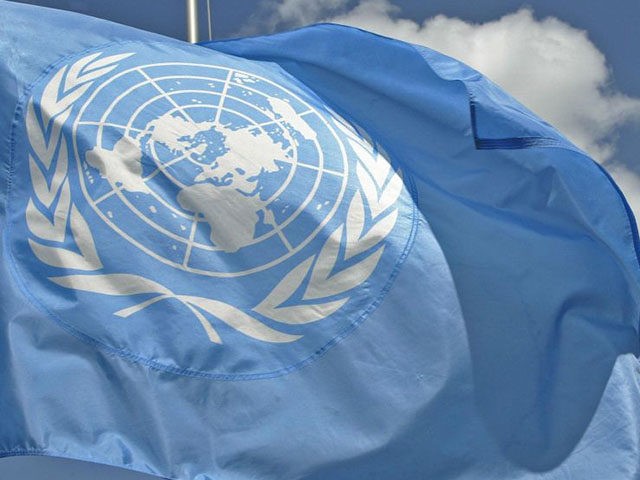The president of the United Nations General Assembly has teased that this year’s general debate next week — during which all the world’s heads of state may deliver remarks on any topic of their choosing — will feature more world leaders than ever.
Modified to prevent the spread of the Chinese coronavirus, the General Assembly’s general debate will not take place in New York this year, though the global governing agency did not ban world leaders from traveling there. Instead, the U.N. invited leaders to broadcast their remarks virtually or submit prepared video statements. This, U.N. General Assembly President Volkan Bozkir said, resulted in greater access for more world leaders than ever.
Many world leaders typically decline to attend the event due to ill health or aversion to travel, while others fear traveling to the United States and being arrested for human rights crimes.
“Mr. Bozkir told the plenary that next week the General Debate would be addressed by more Heads of State than ever before,” the United Nations news agency reported on Wednesday. Bozkir reportedly insisted that the agency’s productivity “will not be compromised by the circumstances.”
Bozkir did not name any new faces the public will see at the General Assembly or countries participating that had previously not done so. The General Assembly has 193 members and sometimes allows non-state actors like Palestine to deliver speeches. The U.N. also blocks some sovereign states, like democratic Taiwan, from speaking at the behest of authoritarian U.N. members.
The United Nations reportedly advised world leaders submitting video remarks to keep them to 15 minutes, as it does when leaders take the stage in New York. Many world leaders, particularly those of rogue states, disregard this suggestion regularly.
The annual General Assembly session began this week, with smaller meetings featuring high-level representatives from around the world. While the general debate – the open platform for heads of state – is its hallmark event, other, smaller roundtables and debates are traditionally part of the General Assembly meeting. Bozkir announced this week that he has organized two special sessions to debate global response to the Chinese coronavirus pandemic and a panel “against corruption.”
Bozkir did not specify if the topics would overlap. The pandemic has resulted in reports of outrageous corruption in some of the world’s least developed countries. Among the nations prosecuting or firing government officials over accusations of embezzling funds meant to fight the Chinese coronavirus are Zimbabwe, China, South Africa, Bolivia, Colombia, and Brazil.
The U.N. granted this year’s general debate the theme “The Future We Want, the United Nations We Need: Reaffirming Our Collective Commitment to Multilateralism — Confronting COVID-19 [Chinese coronavirus] Through Effective Multilateral Action.” While the coronavirus pandemic is expected to be a prime topic in most world leaders’ speeches, the U.N. has also encouraged them to celebrate the 75th birthday of the United Nations itself.
In its three-quarters of a century, the United Nations has faced child rape accusations against its peacekeeping forces throughout Africa and Haiti; triggered outbreaks of non-native diseases in already-impoverished countries; failed to act to contain multiple genocides; and largely permitted corruption by officials in the administration.
Brazil’s President Jair Bolsonaro, a conservative who has been at the forefront of the global movement against lockdowns to contain the Chinese coronavirus, is expected to address the general debate first on Tuesday. Brazil traditionally opens the General Assembly debate in recognition of the fact that, when the U.N. held its first debate, most member nations were hesitant to speak first, and Brazil’s leaders offered to break the ice given their relatively little involvement in World War II.
Bolsonaro personally contracted coronavirus in July after months of dismissing it as a “little cold” and telling Brazilians to “take it like a man” and not stop going about their daily business. In less than a month, Bolsonaro — at 65, on the cusp of a high-risk age — tested negative for coronavirus, spending those weeks in isolation and taking hydroxychloroquine, an anti-malarial that some have claimed may have a positive effect against the virus, though scientific research on its potential remains inconclusive. The World Health Organization (W.H.O.) — a U.N. body that falsely claimed the Chinese coronavirus was not infectious from person-to-person in January — has discouraged the use of hydroxychloroquine, a topic Bolsonaro is likely to broach in his remarks.
Last year, Bolsonaro used his first-ever address at the venue to accuse the United Nations — and the Americas subsidiary of the W.H.O. in particular — of participating in “slave labor” through the enslavement of Cuban doctors sold to Brazil under socialist ex-President Luiz Inácio Lula da Silva.
President Donald Trump is expected, like last year, to follow Brazil, as America hosts the United Nations headquarters. White House Chief of Staff Mark Meadows confirmed last week that Trump will not travel to New York for in-person remarks, though it remains unclear if he will record a statement for the session.

COMMENTS
Please let us know if you're having issues with commenting.